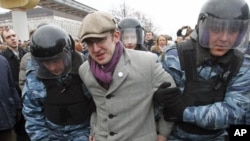In the two weeks that have passed since Russian Prime Minister Vladimir Putin won a six-year term as president, analysts say the Kremlin is moving to weaken the opposition movement that flourished in Russia last winter.
In the last week, police detained hundreds of people at protests in Moscow and St. Petersburg. Three members of a protest punk band were imprisoned for two months on charges of hooliganism. Two environmentalists were arrested for photographing a governor’s mansion being built in a national park. And a Moscow judge sentenced to five years in jail the man who organized Internet fundraising campaigns that paid for loudspeakers and stages for last winter’s outdoor protests.
Natalia Pelevine, coordinator of the Committee for Democratic Russia, spoke to VOA just after the Moscow mayor’s office rejected her request Monday for a protest in the case of Sergei Magnitsky, the lawyer who died in a Moscow prison three years ago.
"Their desire is to get us off the streets completely, potentially get rid of us one way or another, whether to make us flee the country, or maybe they even have in mind locking some of us up," said Pelevine.
Hammering dissension
The opposition was hit by two blows in quick succession.
On Thursday night, a Moscow judge handed down the five-year sentence against Alexei Kozlov, the man who organized an Internet payment system for the winter rallies. This system raised money through small donations on the Russian Internet, freeing the opposition of charges that rallies were financed by Russian oligarchs or by Western powers.
Last September, Russia’s Supreme Court overturned a guilty verdict against Kozlov on unrelated financial charges. But when he became a key figure in the opposition, he was quickly retried, sentenced and sent to prison.
Further fueling opposition anger, state-controlled TV channel NTV aired a special program on Friday charging that many protesters against Putin were migrant workers paid with "money or cookies."
Voicing criticism
As many as 1,000 demonstrators massed Sunday outside Moscow’s TV tower. They laid cookies and fake dollar bills at the station’s front door. The protest was unauthorized, and police detained more than 100 people.
Nikolai Petrov, an analyst at the Carnegie Endowment, said the Kremlin’s goal is to suppress public protest before warm weather arrives in Moscow.
"The idea is to avoid these large-scale demonstrations here in Moscow. The problem is that the political crisis is still in place, and it is not fixed. And even if the demonstrators will disappear from the streets, it will not mean that the Kremlin can celebrate this as their victory," said Petrov.
Looking ahead to May, president-elect Putin announced that a five-day "gardening holiday" would surround his inauguration on Monday, May 7. He hopes that instead of protesting, Muscovites will be at their dachas when he starts his new, six-year term.
In another strategy, the government wants to redirect protests from the streets to new political parties. In coming days, Russia’s Duma is expected to approve a law that will radically reduce requirements for forming new parties. By the summer months, Russia’s opposition could be fragmented into dozens of small parties.
Changing Kremlin strategy amid economic challenges
Petrov said more stability would be provided by the creation of a large opposition party.
“They are making a mistake, not coming forward with the political reform because in my view, political reform is needed for them much more than for anybody else,” said Petrov.
Petrov and other analysts see the Kremlin facing big post-election economic headaches.
For starters, price freezes will be lifted on gasoline and electricity bills, leading to highly unpopular price hikes. Second, a growing pension gap caused by Russia’s aging population may force the Kremlin to raise retirement ages, currently 55 for women and 60 for men.
Finally, Putin’s election campaign promises to add up to $160 billion in new spending during his term. These promises include more weapons for the military and big salary hikes for doctors and teachers. Economists say this can only be financed if world oil prices keep rising - from their already high levels.
News
Police Crack Down on Opposition in Post-election Russia
- By James Brooke










